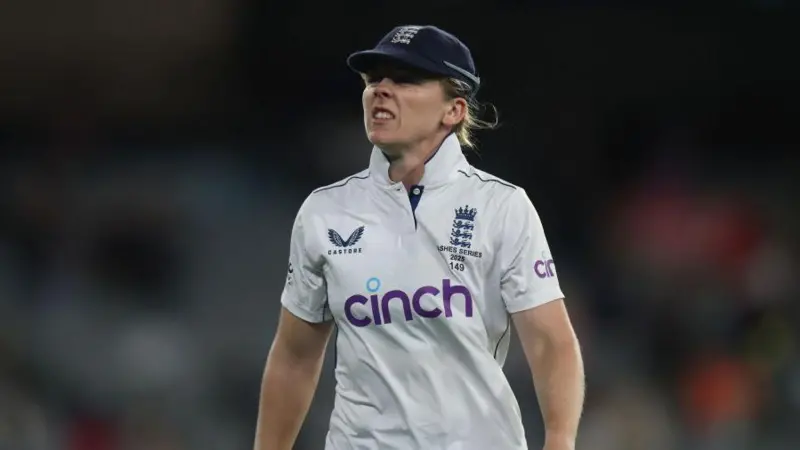
Knight Sacked as England Captain After Ashes Defeat: A New Era for Women’s Cricket
England’s cricket team has experienced a significant shake-up following a devastating 16-0 defeat in the Ashes series in Australia. Heather Knight, who has captained the team since 2016, has been removed from her role as England Women’s Cricket captain. Knight’s tenure, which included notable successes as well as challenging periods, comes to an end after a winter campaign marked by a lackluster T20 World Cup and a disappointing Ashes tour. In the wake of Knight’s sacking, the England and Wales Cricket Board (ECB) is set to embark on a rebuilding phase, beginning with the appointment of a new captain.
The Rise and Fall of Knight as England Captain
Heather Knight’s reign as England captain began in 2016, following the retirement of legendary Charlotte Edwards. The leadership transition marked a new era for England’s women’s cricket team, and Knight was tasked with leading a side in transition. In her early years, Knight oversaw a successful campaign, including an ICC Women’s World Cup win in 2017, when England triumphed over India at Lord’s. This victory remains one of the brightest highlights of her captaincy, solidifying her status as a respected figure in the sport.
Knight’s leadership style, characterized by calmness and tactical astuteness, earned her widespread praise. Under her guidance, England enjoyed a series of impressive wins across formats, including 134 victories in 199 matches. She captained the team in 8 Tests, 94 one-day internationals, and 96 T20s, demonstrating her versatility across all formats of the game. However, despite her accomplishments, Knight’s leadership could not prevent England from faltering in critical series, including the Ashes.
The Ashes Defeat: A Turning Point in Knight Captaincy
The Ashes series defeat was a crushing blow for Knight’s tenure as England captain. For the first time since the multi-format points system was introduced in 2013, an Ashes series ended with a 16-0 scoreline in favor of Australia. This outcome has led to widespread criticism of the team’s performance, including Knight’s leadership during the series. Although Knight led England to a World Cup victory on home soil, she struggled to deliver success in the Ashes, failing to win the series in five attempts during her time in charge.
The recent Ashes tour saw Australia dominate in every facet of the game, leaving England with no answers. From the outset, Australia displayed superior skill and mental toughness, while England’s struggles were evident throughout the series. The heavy defeat was a culmination of several disappointing results during the past few years, contributing to Knight’s eventual removal from the captaincy.
Knight Legacy: A Leadership Marked by Achievement and Challenges
While her tenure was marked by the frustration of Ashes losses, Heather Knight’s leadership has also been defined by several key successes. Knight’s ability to lead a team through turbulent periods, including the post-Edwards transition, and to secure England’s 2017 Women’s World Cup victory is a testament to her resilience and leadership qualities. Her calm demeanor under pressure, her sharp cricketing mind, and her support of young players are all aspects of her captaincy that earned her the respect of both teammates and opponents alike.
However, the challenges that Knight faced in recent years, including the disappointing T20 World Cup performance and the Ashes defeat, have overshadowed these achievements. Despite this, Knight has remained gracious in the face of adversity. In her statement following the announcement of her sacking, Knight expressed her gratitude for the opportunity to captain England, stating that it had been the most rewarding period of her career. She emphasized her pride in being part of the significant strides made in women’s cricket, both on and off the field.
The Future of England Women’s Cricket: A New Captain on the Horizon

Knight Legacy: A Leadership Marked by Achievement and Challenges
Following Heather Knight’s departure from the captaincy, the ECB will now focus on finding a successor. The search for a new leader comes at a crucial time, as several senior players in the squad are nearing the end of their careers. The transition to a new era will likely involve the introduction of younger players, supported by a fully professional domestic cricket system that aims to strengthen the depth of talent in the England squad.
Several names have been suggested as potential candidates to replace Knight. Nat Sciver-Brunt, who has deputized for Knight on multiple occasions, and wicketkeeper Amy Jones are among the front-runners. Both have shown leadership qualities in their roles as vice-captains and have the experience needed to step into the role of captain. There has also been speculation surrounding the potential candidacy of off-spinner Charlie Dean, whose leadership experience at the domestic level has led to calls for her inclusion in the captaincy discussion.
Regardless of who takes over the captaincy, the focus will be on revitalizing England’s performances across formats. With an upcoming summer home series against the West Indies, followed by matches against India in June and July, the new captain will have an immediate opportunity to set the tone for the team’s future.
Off-Field Issues and the Need for a Cultural Reset
In addition to the on-field struggles, there were off-field controversies during the Ashes tour that have added pressure to the England team. A series of unwanted headlines regarding player attitude, including an incident involving spinner Sophie Ecclestone refusing an interview with former player Alex Hartley, led to increased scrutiny of the team’s dynamics. The ECB has emphasized the importance of addressing these cultural issues, with Clare Connor, England’s director of women’s cricket, describing the incident as “unfortunate” and vowing that it would not happen again.
The off-field issues, combined with the disappointing performances on the field, contributed to the decision to remove both Knight and head coach Jon Lewis. The ECB’s review of the Ashes tour, although not yet fully published, has been instrumental in prompting this leadership shake-up. As part of the rebuilding process, the new captain and coach will need to address both the cricketing and cultural aspects of the team to ensure England’s future success.
A Time of Transition for England Women’s Cricket
Knight’s departure marks the beginning of a new era for England Women’s Cricket. The team is at a crossroads, with several veteran players potentially nearing the end of their international careers and a wealth of young talent emerging from the domestic system. The appointment of a new captain and coach will be pivotal in shaping the direction of the team moving forward.
While Knight’s legacy as captain is defined by both triumphs and struggles, her contributions to the growth of women’s cricket in England cannot be overlooked. As Knight focuses on her batting and supports the team in her new role as a player, the future of England Women’s Cricket rests on the shoulders of the next generation of players, guided by fresh leadership.
In conclusion, the sacking of Heather Knight as England captain represents the end of one chapter and the beginning of another in the evolving story of women’s cricket. As England looks to rebuild and grow, the team’s future success will depend on strong leadership, unity, and a commitment to improving both on and off the field.

























































































There are no comments yet. Be the first to comment!